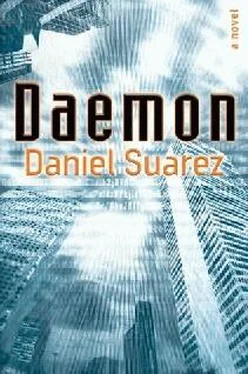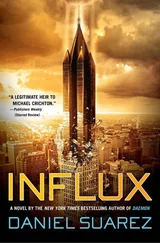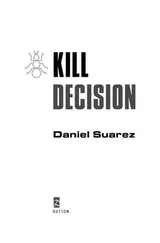Both men shook their heads.
He walked up. “I guess we wait.”
* * *
The late afternoon sun was sinking toward the hills. They had been waiting and sweating for a couple of hours in the brutal heat, listening to the wind chimes dangling from the eaves of a nearby utility shed. The chimes sounded all too infrequently.
Khan mopped his face with the front of his black T-shirt. “Goddamn. It is Africa hot.”
McCruder upended a soda can. Nothing came out. “I thought you Indians thrived in this weather, Khan.”
“Fuck you. I grew up in Portland, moron.”
Voelker wiped the salty sweat from his eyes. He blinked from the sting. “Guys, I swear, I’ll take a tire iron to you both if you don’t quit your bitching.”
They heard a blip-blip sound from the nearby laptop. They snapped to attention.
Khan leaned over McCruder’s shoulder to look at the LCD screen.
McCruder looked up to Voelker. “It’s here.”
All three turned expectantly to the asphalt.
Suddenly the car engine roared to life. It revved several times. The wheels turned left, then right.
They all watched transfixed.
Khan grinned. “It’s alive ! Bu-wahahahah!”
Suddenly the car’s engine raced, and it laid down rubber, accelerating madly along the asphalt track.
“Jesus!” Voelker turned to the other two. “What the hell is it doing?”
“Don’t know, but look at it go, man.”
The Lincoln was weaving side to side, then it suddenly slammed on the brakes and screeched to a halt. It peeled out suddenly again and went into a power slide, whipping its tail around. It roared forward again, building up speed on the straightaway, then wrenched its wheels into another slide, and came out facing the other direction—still accelerating into a bootlegger reverse.
McCruder smiled. “It’s testing the properties of the car.”
Khan and Voelker leaned in, while still watching the screeching display of stunt driving.
McCruder spoke louder. “It’s confirming the specs. Braking distance, turning radius—all that stuff. It’s making sure we followed instructions.”
Voelker pointed a finger at McCruder. “It damn well better meet the spec.”
Without turning, McCruder extended his closed fist, then operated his thumb like a crank to extend his middle finger.
Suddenly the car stopped its acrobatic display and sat motionless on the pavement. Oily rubber smoke still wafted across the track.
All three men stared at it. It was half a football field away.
A Bullwinkle the Moose voice came over the speakers of McCruder’s laptop. “Duhhh, you have mail.”
McCruder checked.
While McCruder was busy, Khan looked at his own laptop screen. He grinned at Voelker. “We no longer have a connection to the car, Kurt. It changed the access codes.”
Voelker didn’t flinch. “It’s part of the spec, Khan.”
McCruder glanced up at his companions. “Let me confirm this.” After a few frenzied moments of clicking, he smiled and turned to them again. “Fifty-six thousand dollars have been deposited into the corporate account, and we have an order for six more AutoM8s. The Daemon is pleased with our offering.”
They whooped and high-fived.
“What will that total?” Khan was beaming.
Voelker thought for a second. “Three hundred thousand and change.” He looked to McCruder. “Does it say where the cars will be coming from?”
McCruder shook his head. “Doesn’t matter. Corporate leases, probably. Not our problem. Looks like the Haas has downloaded more plans, too.”
“Excellent.” Voelker smiled at them both. “Congratulations, gentlemen.”
Suddenly the distant car roared into action again—laying down more rubber. They all turned. It was accelerating toward them.
“It’s gonna whack us!”
They ran for the van, but the Town Car raced past their table and out along the dirt road. It accelerated and kept going.
They gathered their breath and watched it recede into the distance.
Khan turned to them. “We should follow it. You know, back to its lair.”
McCruder narrowed his eyes. “What, are you fucking insane?”
Voelker nodded. “He’s right. We released it into the wild. Those were the instructions. Following it is just a good way to get killed.”
Khan watched the cloud of dust moving toward the distant hills. “You think we’re the only ones doing this?”
Voelker watched, too, shielding his eyes against the sun. “If the number of unemployed electrical engineers is any indication, I’d say no.”
Chapter 31:// Red Queen Hypothesis
Garrett Lindhurst marched purposefully toward the corner office on the fifty-first floor of Leland Equity Group’s palatial world headquarters. He clenched a rolled magazine in his hand like a baton in a slow-motion relay race and looked visibly worried. Worried about systems.
As chief information officer, Lindhurst held dominion over the systems that delivered the lifeblood of Leland Equity Group: real-time financial data. That data was delivered instantaneously to every corner of the organization and to every client. Every account and every dollar in every branch office passed through Lindhurst’s networks and data systems. Every e-mail passed through his servers. He had thirty regional VPs as direct reports and oversaw an empire of some five hundred IT employees worldwide.
And yet, Leland Equity Group was one of those multibillion-dollar companies that existed on the periphery of public awareness. Their unremarkable logo could be found in the skyline of any major city in North America, Europe, or Asia, and even if most people had no idea what the company did, they assumed it must be doing something important.
The reality was that, with eighty billion dollars in assets under management, the decisions made by Leland MBAs ruled the daily lives of two hundred million Third World people.
Following a (more or less) Darwinian economic model, Leland identified and quantified promising resource development opportunities in the far corners of the world. They had since formed private equity partnerships with local leaders for strip mining in Papua New Guinea, water privatization in Ecuador, marble quarrying in China, oil drilling in Nigeria, and pipeline construction in Myanmar. Anywhere local public and/or private leaders existed with abundant resources, a surfeit of rivals, and a deficit in capital, Leland could be found. And while these projects were theoretically beneficial, the benefits were best perceived at a distance of several thousand miles.
Leland’s equity offerings used tedious statistical analysis to mask the fact that their business centered on enslaving foreign people and ravaging their lands. They didn’t do this directly, of course, but they hired the people who hired the people who did.
Humanity had always trafficked in oppression. Before the corporate marketing department got ahold of it, it was called conquest . Now it was regional development. Vikings and Mongols were big on revenue targets, too—but Leland had dispensed with all the tedious invading, and had taken a page out of the Roman playbook by hiring the locals to enslave each other as franchisees.
To view Leland fund managers as immoral was a gross simplification of the world. And what was there to replace capitalism, anyway? Communism? Theocracy? Most of the Third World had already suffered nearly terminal bouts of idealism. It was the Communists, after all, who had littered the world with cheap AK-47s in order to “liberate” the masses. But the only lasting effect was that every wall between Cairo and the Philippines had at least one bullet hole in it. But nothing changed. Nothing changed because these alternate belief systems flew in the face of human nature. Of even common sense. Anyone who has ever tried to share pizza with roommates knows that Communism cannot ever work. If Lenin and Marx had just shared an apartment, perhaps a hundred million lives might have been spared and put to productive use making sneakers and office furniture.
Читать дальше












